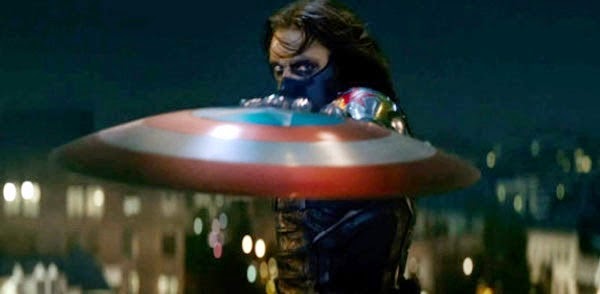You need to understand that I don't mean to say that he is the most popular hero (Iron Man) nor my personal favorite (Hulk). I am not saying that he is the smartest nor the strongest. I'm not even saying that he's the most important (although I believe that he is). When I say that Captain America is the greatest Marvel hero, I mean exactly that: well and above everybody else, he exhibits the qualities greatness.
Captain America is a boy scout. He's Marvel's answer to the unimpeachable morality of Superman: "an ideal [...] to strive towards" rather than one of Marvel's managerie of narcissistic, hubristic, emotionally damaged or just otherwise flawed characters. He is such an innately good character that his only development over his three big screen appearances is that he's not quite as innocent about the ways of the 21st Century as he used to be (and even that slight wrinkle in his star-spangled persona only came after his best friend, who he thought was killed in action, resurfaced as a brainwashed assassin working for the Nazi faction that he supposedly defeated in 1945, which has now infultrated the United States government at its highest levels).
Compare him for a moment to Tony Stark, the most dynamically developed of Marvel's crop of big screen superheroes. We are introduced to him as a self-described "genius, billionaire, playboy philanthropist:" a flippant, narcicistic douchebag who's as dickish as he is fun. He's an arms dealer: designing and selling next-gen weapons as he profits off of war and death. Sure, he's doing it for the right reasons (to protect America from its enemies by constantly supplying it with the next nuclear deterrent), but that doesn't change who he is nor what he's doing. Iron Man is about him understanding, in a truly fundamental way, the cost that his business is having on world security and taking responsibility for the unintended harm he has caused. Iron Man 2 focusses on his substance abuse and reckless, devil-may-care attitude toward life and the people who are most important to him, ending with him trying to do right by those same people.
In The Avengers, we see the former "iron monger" speak out against nuclear deterrents: the entire business model for his company only four years ago, realize his goal of supplying the world with sustainable clean energy and finally put the good of the many before the good of himself: launching himself into the Chitauri wormhole in order to save New York from an ill-conceived nuclear strike. In Iron Man 3, we see a shell-shocked Tony attempting (and generally failing) to grapple with the events of The Avengers: realizing that he is just "a man in a can" in a world of aliens, gods and monsters. And, at the end of the day, he realizes that he isn't Iron Man because of a suit of armor; Iron Man is an aspect of his personality: an expression of his desire to be a better person than he was in the not-so-distant past.
It took him three solo films and a crossover team-up before he got to where Steve Rogers was in the beginning of The First Avenger. When we are first introduced to Rogers, he's failing his fourth attempt to enlist in the army during World War II. Knowing full-well that he is physically uqualified and will return home in a body bag if he ships out, he still desperately tries to do his part for the war effort because "men are laying down their lives [and he has] no right to do any less than them." When asked if he just wants to kill Nazis, he says no: "I don't want to kill anyone. I don't like bullies; I don't care where they are from."
He's polite and respectful toward women in a time of wide-spread sexism, stands up to disrespectful loud-mouth in a movie theater and even threw himself on a grenade in the hope that his fellow soldiers would survive the blast. As in the comics, he does what he should do rather than what he is ordered to do. He disobeys a direct order from a superior officer in order to mount a one-manned rescue mission "thirty miles behind [enemy] lines, through some of the most heavily fortified territory in Europe" simply because he believes that it's the right thing to do. When S.H.I.E.L.D. essentially weaponizes The Patriot Act by launching a trio of next gen helicarriers to pre-emptively assassinate terrorists (both actual and potential) he argues that "this isn't freedom. This is fear" and rage-quits the agency.




No comments:
Post a Comment